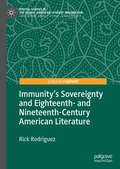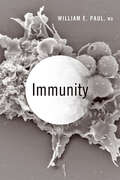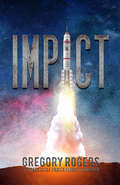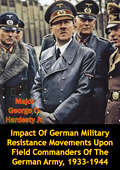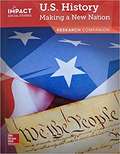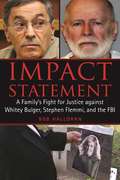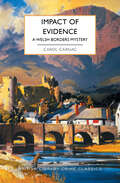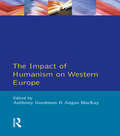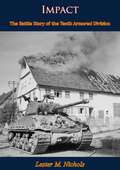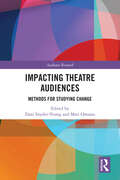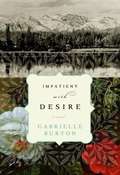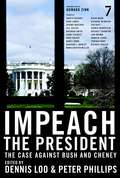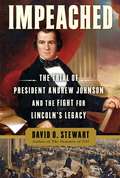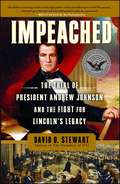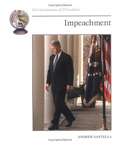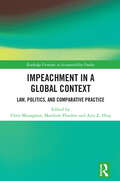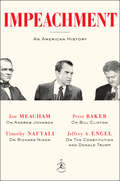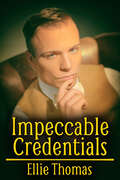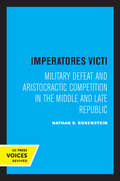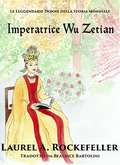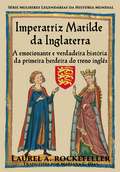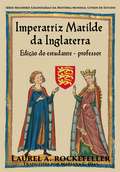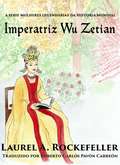- Table View
- List View
Immunity's Sovereignty and Eighteenth- and Nineteenth-Century American Literature (Pivotal Studies in the Global American Literary Imagination)
by Rick RodriguezImmunity’s Sovereignty and Eighteenth- and Nineteenth-Century American Literature tracks flashpoint events in U.S. history, constituting a genealogy of the effectiveness and resilience of the concept of immunity in democratic culture. Rick Rodriguez argues that following the American Revolution the former colonies found themselves subject to foreign and domestic threats imperiling their independence. Wars with North African regencies, responses to the Haitian revolution, reactions to the specter and reality of slave rebellion in the antebellum South, and plans to acquire Cuba to ease tensions between the states all constituted immunizing responses that helped define the conceptual and aesthetic protocols by which the U.S. represented itself to itself and to the world’s nations as distinct, exemplary, and vulnerable. Rodriguez examines these events as expressions of an immunitary logic that was—and still is— frequently deployed to legitimate state authority. Rodriguez identifies contradictions in literary texts’ dramatizations of these transnational events and their attending threats, revealing how democracy’s exposure to its own fragility serves as rationale for immunity’s sovereignty. This book shows how early U.S. literature, often conceived as a delivery system for American exceptionalism, is in effect critical of such immunitary discourses.
Immunity: Innate Immunity (Advances In Experimental Medicine And Biology Ser. #560)
by William E. PaulA leading figure in immunology takes readers inside the remarkably powerful human immune system.Winner of the CHOICE Outstanding Academic Title of the Choice ACRLThe immune system has incredible power to protect us from the ravages of infection. Boosted by vaccines, it can protect us from diseases such as measles. However, the power of the immune system is a double-edged sword: an overactive immune system can wreak havoc, destroying normal tissue and causing diseases such as type I diabetes, rheumatoid arthritis, and multiple sclerosis. The consequences of an impaired immune system, on the other hand, are all too evident in the agonies of AIDS.Packed with illustrations, stories from Dr. William E. Paul’s distinguished career, and fascinating accounts of scientific discovery, Immunity presents the three laws of the human immune system—universality, tolerance, and appropriateness—and explains how the system both protects and harms us. From the tale of how smallpox was overcome and the lessons of the Ebola epidemic to the hope that the immune system can be used to treat or prevent cancer, Dr. Paul argues that we must take advantage of cutting-edge technologies and promising new tools in immunological research.
Immunology of the Fungal Diseases
by Rebecca A. CoxThis informative text is divided into eight chapters, each of which presents a comprehensive review of natural and acquired host defense mechanisms in a major mycotic disease. The chapters are written by distinguished scientists whose studies have contributed significantly to the understanding of the immunology of the mycoses. This text should provide a valuable reference for researchers, practicing clinicians, and new investigators entering this expanding field.
Imogene's Last Stand
by Candace Fleming Nancy CarpenterMeet Imogene, a plucky heroine with a passion for history.As a baby, Imogene's first words were "Four score and seven years ago." In preschool, she fingerpainted a map of the Oregon Trail. So it's not surprising that when the mayor wants to tear down the long-neglected Liddleton Historical Society to make room for a shoelace factory, Imogene is desperate to convince the town how important its history is. But even though she rides through the streets in her Paul Revere costume shouting, "The bulldozers are coming, the bulldozers are coming!" the townspeople won't budge. What's a history-loving kid to do? Filled with quotes from history's biggest players--not to mention mini-bios on the endpapers--and lots of humor, here's the perfect book for budding historians.From the Hardcover edition.
Impact
by Gregory RogersMission commander, Donna Kennedy, faces disaster for herself and her crew. In an event rivaling only Apollo 13, a space shuttle mission faces absolute failure. The Columbia is damaged in space and cannot safely return to Earth. Finding a way to bring the crew home safely will be NASA’s greatest challenge since the infamous mission to the Moon. For Donna, however, it will be the most extreme situation she has ever faced. For the engineers and managers at Kennedy Space Center and Johnson Space Center, they must overcome tremendous challenges to save the lives of seven astronauts. In the course of the story, details of past NASA tragedies will be explained in a manner that will forever change how Americans view the history of the loss of Challenger in 1986 and Columbia in 2003. Truths must be told.
Impact Of German Military Resistance Movements Upon Field Commanders Of The German Army, 1933-1944
by Major George D. Hardesty Jr.A revolutionary tradition did not exist in the Imperial German Army. But during the years 1918-1944 events occurred which produced such an impact on the moral fibre of the German Officer Corps that eventually a few of them participated in a conspiracy against Hitler. This work seeks only to throw light on those aspects of German military history that portray the gradual disintegration of the monolithic structure of the German Army that occurred prior to 20 July 1944.The study has been divided into four major parts: the revolutionary days following the defeat of World War I, 1918-1920; the development of the Reichswehr and the rise to power of Hitler, 1920-1933; the transition from Reichswehr to Wehrmacht, 1933-1938; and the period of active opposition to Hitler, 1938-1944. The analysis, generally, follows a chronological course, and results in an examination of those events which influenced the German officers who were the field commanders of World War II.In this tragedy, it would appear that the German Officer Corps was less to blame for its actions--or lack of action within the broader framework of the German nation--than has often been believed to be the case, primarily because the actions of the officers were often the result of factors beyond the control of soldiers. Such a conclusion may be at variance with that of other writers on the subject. The weight of evidence examined, however, will not support a different conclusion, particularly when one analyzes the conduct of tactical units at Field Army and lower echelons of command.In this century the soldiers of the German Army have undergone two severe tests. It remains only for history to establish the answer to this question: Has this been the German Army's guilt or the German Army's fate?
Impact Social Studies: U.S. History: Making a New Nation, Grade 5, Research Companion
by William Deverell James Banks Kevin CollearyNIMAC-sourced textbook
Impact Statement: A Family's Fight for Justice against Whitey Bulger, Stephen Flemmi, and the FBI
by Bob HalloranNo one can deny that mob boss James "Whitey" Bulger and Stephen "The Rifleman" Flemmi are two of the most brutal killers in American history—not even the two gangsters themselves. But a jury denied the Davis family closure for the slaying of Debbie Davis, Flemmi's beautiful young girlfriend, who went missing in 1981 and whose remains were found nearly twenty years later under the Neponset River Bridge in Quincy, Massachusetts.Now serving a life sentence, Stephen Flemmi testified in graphic detail how he lured Debbie to a house in South Boston where Bulger jumped out of the shadows and strangled her to death. Flemmi then extracted her teeth and buried her body by the Neponset River while Bulger watched. Bulger wanted Debbie dead, Flemmi claimed, because she knew that the two men were meeting with an FBI agent named John Connolly. That, and he might have been jealous of the time Flemmi and Debbie were spending together. Throughout his trial, Bulger stubbornly insisted that he never would have committed the dishonorable act of killing a woman. In the end, it was one stone-cold murderer's testimony against another's.In Impact Statement, veteran journalist Bob Halloran looks at the devastating impact Bulger and Flemmi have had on the Davis family, whose longstanding relationship with the two mobsters cost them a father, two sisters, and a brother. Through up-to-the-minute coverage of Bulger's criminal trial and extensive interviews with Debbie's brother Steve Davis, a one-time protégé of Flemmi's and now an outspoken advocate for the victims' families, Halloran has pieced together this unique and compelling story of a family's quest for justice.
Impact of Evidence: A Welsh Borders Mystery (British Library Crime Classics)
by Carol CarnacNear St. Brynneys in the Welsh border country, isolated by heavy snow and flooding from the thaw, a calamity has occurred. Old Dr. Robinson, a known 'menace on the roads', has met his end in a collision with a jeep on a hazardous junction. But when the police arrive at the scene, a burning question hints at something murkier than mere accident: why was there a second body—a man not recognised by any locals—in the back of Robinson's car?As the local inspectors dive into the muddy waters of this strange crime, Chief Inspector Julian Rivers and Inspector Lancing are summoned from Scotland Yard to the windswept wilds, where danger and deceit lie in wait.Puzzling and atmospheric, this exceedingly rare mystery from one of the masters of crime fiction's Golden Age returns to print for the first time since its publication in 1954.
Impact of Humanism on Western Europe During the Renaissance, The
by Angus Mackay A. GoodmanAn up-to-date synthesis of the spread and impact of humanism in Europe. A team of Renaissance scholars of international reputation including Peter Burke, Sydney Anglo, George Holmes and Geoffrey Elton, offers the student, academic and general reader an up-to-date synthesis of our current understanding of the spread and impact of humanism in Europe. Taken together, these essays throw a new and searching light on the Renaissance as a European phenomenon.
Impact: The Battle Story of the Tenth Armored Division
by Lester M. NicholsOriginally published in the 1950s, this book is the official unit history for the 10th Armored Division in World War II. The 10th Armored Division served in the ETO.“Major Nichols was press officer of the unit in question during its period of combat service, which has given him access to a vast amount of official documentary material. But the study of documents has been supplemented by personal interviews with a large number of surviving men and officers of the Division. As a result, Major Nichols' account comes very close to the basic realities of warfare as revealed in the day-by-day operations of a combat unit.The Tenth Armored Division, frequently referred to as "the Tigers," landed at Cherbourg in September, 1944, and during the next few months was engaged almost continuously in the offensive operations involved in the penetration of the Siegfried Line and the actual invasion of Germany. Its long smashing drive carried it by the end of the war through southern Germany to the vicinity of the Brenner Pass. The Tenth Armored Division appears to have served in the role of "trouble-shooter," and the Germans nicknamed it the "ghost division" due to its frequent and unexpected appearances in critical sectors. Major Nichols gives a vivid and fascinating account of the slamming, slashing tactics characteristic of tank units in modern war. For most readers the high point of the narrative will be the chapters dealing with the epic defense of Bastogne during the Battle of the Bulge in the winter of 1944-1945.The many illustrations and battle maps and diagrams are an outstanding feature of the volume and contribute greatly to the value and interest of the narrative...It is a notable contribution to the ever-growing literature of World War II.”-Wayne E. Stevens
Impacting Theatre Audiences: Methods for Studying Change (Audience Research)
by Dani Snyder-Young Matt OmastaThis edited collection explores methods for conducting critical empirical research examining the potential impacts of theatrical events on audience members. Dani Snyder-Young and Matt Omasta present an overview of the burgeoning subfield of audience studies in theatre and performance studies, followed by an introduction to the wide range of ways scholars can study the experiences of spectators. Consisting of chapter length case studies, the book addresses methodologies for examining spectatorship, including qualitative, quantitative, historical/historiographic, arts-based, participatory, and mixed methods approaches. This volume will be of great interest to theatre and performance studies scholars as well as industry professionals working in marketing, audience development and community engagement.
Impatient with Desire
by Gabrielle BurtonA great adventure.A haunting tragedy.An enduring love.In the spring of 1846, Tamsen Donner, her husband, George, their five daughters, and eighty other pioneers headed to California in eager anticipation of new lives out West. Everything that could go wrong did, and an American legend was born.The Donner Party. We think we know their story--starving pioneers trapped in the mountains performing an unspeakable act to survive--but we know only that one harrowing part of it. Impatient with Desire brings us answers to the unanswerable question: What really happened in the four months the Donners were trapped in the Sierra Nevadas And it brings to stunning life a woman--and a love story--behind the myth.Tamsen Eustis Donner, born in 1801, taught school, wrote poetry, painted, botanized, and was fluent in French. At twenty-three, she sailed alone from Massachusetts to North Carolina when respectable women didn't travel alone. Years after losing her first husband, Tully, she married again for love, this time to George Donner, a prosperous farmer, and in 1846, they set out for California with their five youngest children. Unlike many women who embarked reluctantly on the California-Oregon Trail, Tamsen was eager to go. Later, trapped in the mountains by early snows, she had plenty of time to contemplate the wisdom of her decision and the cost of her wanderlust.Historians have long known that Tamsen kept a journal, though it was never found. In Impatient with Desire, Burton draws on years of historical research to vividly imagine this lost journal--and paints a picture of a remarkable heroine in an extraordinary situation. Tamsen's unforgettable journey takes us from the cornfields of Illinois to the dusty Oregon Trail to the freezing Sierra Nevada Mountains, where she was forced to confront an impossible choice.Impatient with Desire is a passionate, heart-wrenching story of courage, hope, and love in hardship, all told at a breathless pace. Intimate in tone and epic in scope, Impatient with Desire is absolutely hypnotic.tic.
Impeach the President: The Case Against Bush and Cheney
by Howard Zinn Dennis Loo Peter PhillipsThis brilliantly argued and wonderfully written collection by twenty-two of the best political analysts in the US analyzes the extraordinary and unprecedented threat the White House and its allies present to civil liberties, civil rights, the Constitution, international law, and the future of the planet. Impeach the President unearths the stories behind election fraud in 2000 and 2004, the overt lies used to justify pre-emptive war on Iraq, the extensive, ongoing commission of war crimes and torture, the tragic failures in the lead-up to and aftermath of Hurricane Katrina, and lesser-known but equally alarming offences of propaganda and disinformation, illegal spying, environmental destruction, and the violation of the separation of church and state. Loo and Phillips chillingly reveal the full threat behind the radical right-wing force that has taken over the world's most powerful office.
Impeached: The Trial of President Andrew Johnson and the Fight for Lincoln's Legacy
by David O. StewartAfter the Civil War, the nation came close to tearing itself apart, again, during the impeachment struggle between Congress and President Andrew Johnson in the spring of 1868.
Impeached: The Trial of President Andrew Johnson and the Fight for Lincoln's Legacy
by David O. StewartIn 1868 Congress impeached President Andrew Johnson of Tennessee, the man who had succeeded the murdered Lincoln, bringing the nation to the brink of a second civil war. Enraged to see the freed slaves abandoned to brutal violence at the hands of their former owners, distraught that former rebels threatened to regain control of Southern state governments, and disgusted by Johnson's brawling political style, congressional Republicans seized on a legal technicality as the basis for impeachment -- whether Johnson had the legal right to fire his own secretary of war, Edwin Stanton.
Impeachment (Cornerstones of Freedom)
by Andrew SantellaSurveys the history of impeachment in the United States, discussing the basic rules and procedures and notable officials who have been impeached.
Impeachment in a Global Context: Law, Politics, and Comparative Practice (Routledge Frontiers in Accountability Studies)
by Aziz Z. Huq Chris Monaghan Matthew FlindersThis volume considers the use of impeachment within a global context. The book brings together leading scholars and experts to give an insight into significant periods in the development of impeachment and its modern comparative use. Divided into five parts, the opening chapter introduces the topic and underlines its significance in terms of understanding the relationship and inter-dependence among politics, governance and the law. It also offers a novel conceptual framework that facilitates the global mapping of impeachment processes. Part I presents a thematic approach that explores the topic of impeachment through the lenses of democracy, human rights and the rule of law. With these themes in mind, Part II focuses on those parts of the world where impeachment is generally recognised as a core constitutional process including the United States, South Korea, Brazil and other countries in South America. Part III continues with the process of constitutional mapping by moving to a focus on those countries where impeachment is arguably an important but largely secondary or peripheral process. This includes chapters on Denmark, Iceland, Sri Lanka and the Philippines and flows through into Part IV’s focus on areas of the world where impeachment matters and may even be increasing in terms of visibility but, for a number of reasons, arguably exists within a satellite status in terms of constitutional processes and safeguards. The fifth and final section steps back in an attempt to assess impeachment processes from a broad comparative perspective. The collection presents the definitive text on impeachment for students and scholars with an interest in comparative public law, politics and constitutional studies.
Impeachment: An American History
by Jon Meacham Peter Baker Jeffrey A. Engel Timothy NaftaliFour experts on the American presidency examine the three times impeachment has been invoked—against Andrew Johnson, Richard Nixon, and Bill Clinton—and explain what it means today.Impeachment is a double-edged sword. Though it was designed to check tyrants, Thomas Jefferson also called impeachment “the most formidable weapon for the purpose of a dominant faction that was ever contrived.” On the one hand, it nullifies the will of voters, the basic foundation of all representative democracies. On the other, its absence from the Constitution would leave the country vulnerable to despotic leadership. It is rarely used, and with good reason. Only three times has a president’s conduct led to such political disarray as to warrant his potential removal from office, transforming a political crisis into a constitutional one. None has yet succeeded. Andrew Johnson was impeached in 1868 for failing to kowtow to congressional leaders—and, in a large sense, for failing to be Abraham Lincoln—yet survived his Senate trial. Richard Nixon resigned in August 1974 after the House Judiciary Committee approved three articles of impeachment against him for lying, obstructing justice, and employing his executive power for personal and political gain. Bill Clinton had an affair with a White House intern, but in 1999 he faced trial in the Senate less for that prurient act than for lying under oath about it. In the first book to consider these three presidents alone—and the one thing they have in common—Jeffrey A. Engel, Jon Meacham, Timothy Naftali, and Peter Baker explain that the basis and process of impeachment is more political than legal. The Constitution states that the president “shall be removed from Office on Impeachment for, and Conviction of, Treason, Bribery, or other high Crimes and Misdemeanors,” leaving room for historical precedent and the temperament of the time to weigh heavily on each case. This book reveals the complicated motives behind each impeachment—never entirely limited to the question of a president’s guilt—and the risks to all sides. Each case depended on factors beyond the president’s behavior: his relationship with Congress, the polarization of the moment, and the power and resilience of the office itself. This is a realist view of impeachment that looks to history for clues about its potential use in the future.
Impeccable Credentials
by Ellie ThomasSequel to Petticoats and PantaloonsOutwardly, twenty-one-year-old Julian Buchanan is the epitome of wealth, breeding and good looks. He’s a pink of the ton in Regency London, and his position in society is assured. But beneath his impeccable surface, Julian is riddled with doubt.Matters come to a head in the autumn of 1812 when his autocratic father, Sir Roger Buchanan, orders Julian to court an heiress and propose marriage. Finally, Julian must acknowledge that he has no interest in women. At the same time, he becomes involved with Rafe Ingles, a radical intellectual whose beliefs concur with Julian’s inward convictions.With pressure building and so much at stake, can Julian find the courage to break the habit of a lifetime and choose love and freedom over duty?
Imperatores Victi: Military Defeat and Aristocractic Competition in the Middle and Late Republic
by Nathan S. RosensteinGiven the intense competition among aristocrats seeking public office in the middle and late Roman Republic, one would expect that their persistent struggles for honor, glory, and power could have seriously undermined the state or damaged the cohesiveness of the ruling class. Rome in fact depended on aristocratic competition, since no professional bureaucracy directed public affairs and no salary was attached to any public office. But as Rosenstein adeptly shows, competition appears to have been surprisingly limited, in ways that curtailed the possible destructive effects of all-out contests between individuals.Imperatores Victi examines one particularly striking case of such checks on competition. Military success at all times represented an abundant source of prestige and political strength at Rome. Generals who led armies to victory enjoyed a better-than-average chance of securing higher office upon their return from the field. Yet this study demonstrates that defeated generals were not barred from public office and in fact went on to win the Republic's most highly coveted and hotly contested offices in numbers virtually identical with those of their undefeated peers. Rosenstein explores how this unexpected limit to competition functions, reviewing beliefs about the religious origins of defeat, assumptions about common soldiers' duties in battle, and definitions of honorable behavior of an aristocrat during a crisis. These perspectives were instrumental in shifting the onus of failure away from a general's person and in offering positive strategies a general might use to win glory and respect even in defeat and to silence potential critics among a failed general's peers. Such limits to competition had an impact on the larger problems of stability and coherence in the Republic and its political elite; these larger problems are discussed in the concluding chapter. This title is part of UC Press's Voices Revived program, which commemorates University of California Press’s mission to seek out and cultivate the brightest minds and give them voice, reach, and impact. Drawing on a backlist dating to 1893, Voices Revived makes high-quality, peer-reviewed scholarship accessible once again using print-on-demand technology. This title was originally published in 1990.
Imperatrice Wu Zetian
by Laurel A. RockefellerLa donna più odiata nella storia della Cina! Viaggia indietro nel tempo di più di mille anni e incontra la prima e unica imperatrice donna della Cina. Nata come Wu Zhao e nominata col titolo reale di "Zetian" poche settimane prima della sua morte nel 705 DC, era la figlia non voluta del Cancelliere Wu Shihuo -- troppo intelligente, troppo acculturata, e troppo concentrata politicamente per farne una buona moglie secondo le interpretazioni dell'epoca dei Dialoghi di Confucio. C'è da meravigliarsi che ancora oggi rimanga la donna più odiata di tutta la storia cinese e una delle sue più controverse? Esplora la vita dell'Imperatrice Wu e scopri perchè il mondo è un posto completamente diverso perché ha osato ciò che nessuna donna in Cina prima o da allora ha mai sognato.
Imperatriz Matilde da Inglaterra
by Laurel A. RockefellerA leoa destemida da Inglaterra! Nascida em 1102 para o rei Henry da Inglaterra e para a rainha Matilde da Escócia, a ancestralidade normanda, saxã e escocesa de Matilde estava destinada a unificar a Inglaterra ainda dividida pela conquista do avô em 1066. Quando o Desastre do Barco Branco, em 1120, fez dela a única filha sobrevivente de seus pais, Matilde de repente se tornou herdeira do trono inglês em uma época em que o velho Witan saxão, e não o testamento do rei, ainda decidia a sucessão. Descubra a verdadeira história da primeira mulher a reivindicar o trono inglês por direito próprio e inspire-se! Inclui a árvore genealógica da família de Matilde, uma linha do tempo detalhada e uma lista de sugestões de leituras para que você possa continuar aprendendo.
Imperatriz Matilde da Inglaterra: Edição do estudante – professor
by Laurel A. RockefellerA leoa destemida da Inglaterra! Nascida em 1102 para o rei Henry da Inglaterra e para a rainha Matilde da Escócia, a ancestralidade normanda, saxã e escocesa de Matilde estava destinada a unificar a Inglaterra ainda dividida pela conquista do avô em 1066. Quando o Desastre do Barco Branco, em 1120, fez dela a única filha sobrevivente de seus pais, Matilde de repente se tornou herdeira do trono inglês em uma época em que o velho Witan saxão, e não o testamento do rei, ainda decidia a sucessão. Descubra a verdadeira história da primeira mulher a reivindicar o trono inglês por direito próprio e inspire-se! Esta edição do estudante – professor inclui perguntas para estudo desafiadoras depois de cada capítulo, além de uma linha do tempo detalhada e uma extensa lista com leituras sugeridas.
Imperatriz Wǔ Zétiān
by Roberto Carlos Pavón Carreón Laurel A. RockefellerA mulher mais odiada da história chinesa! Viaje no tempo mais de mil anos e conheça o primeiro e único imperador do sexo feminino da China. Nascido Wǔ Zhào e dado o título reinado "Zétiān" apenas algumas semanas antes de sua morte em 705 dC, ela era a filha indesejada do chanceler Wǔ Shihuo - muito brilhante, muito instruída e muito politicamente focada para fazer uma boa esposa de acordo com interpretações contemporâneas dos Analectos de Confúcio. Ela pode ser de admirar que até hoje ela continua a ser a mulher mais odiada em toda a história chinesa e um dos seus mais controversos? Explore a vida da imperatriz Wǔ e descubra por que o mundo é um lugar muito diferente, porque ela ousou o que nenhuma mulher na China antes ou desde sempre sonhou.
